Ngesrepbalong Village, Limbangan District, Kendal Regency has been designated as an ecotourism village with the Decree of the Regent of Kendal no. 556/343/2021. To support the realization of the ecotourism village, the local community is actively carrying out conservation activities for rare plants from Mount Ungaran, including orchids. So far, 26 species of natural orchid species have been conserved and are maintained in a screen house called Omah Anggrek. To complement Omah Anggrek, in 2023 the UNNES Community Service Team has developed a simple-scale plant tissue culture laboratory (KJT) so that conservation activists can propagate orchids and other plants effectively and efficiently. Propagation using KJT requires special skills that conservationists do not yet have optimally. Therefore, in 2024, the Community Service Team of the Biology Cluster, FMIPA UNNES, will carry out training activities on plant propagation using the KJT technique based on the 2024 UNNES LPPM Budget Implementation Document (DPA) based on the Partnership Community Service Implementation Agreement Letter number 686.26.2/UN37/PPK.10/2024.
The training activity was attended by 10 conservationists from the local village starting on August 2, 2024 and was carried out in stages. The training was officially opened by the Head of Ngesrepbalong Village, Mr. Riyono. In his remarks, he stated that the skills of carrying out the KJT technique in a simple-scale laboratory not only play an important role in the preservation of native orchids from Mount Ungaran, but also have the potential to propagate various other plants that are in demand by the community and have high economic value. This initiative is expected to support the tourism development program towards a sustainable ecotourism village.
The training began with an in-depth study of the characteristics of the KJT technique by the team leader, Prof. Dr. Enni Suwarsi Rahayu, M.Si; followed by a discussion and Q&A on the method of plant propagation with KJT guided by Dr. Y. Ulung Anggraito, M.Si. Furthermore, a discussion and practice of sterilization techniques for space and equipment and media creation were conducted guided by Aida Raesa Amalia, S.Si. The next stage was a discussion and practice of subculture and incubation guided by a KJT research student, namely Mirzalul Umam. At this stage, participants carried out subculture or transfer of plantlets to new media.
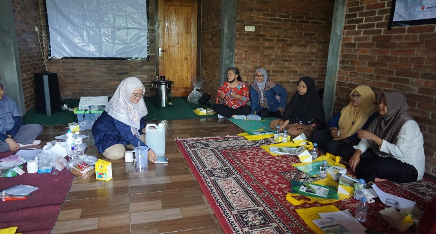
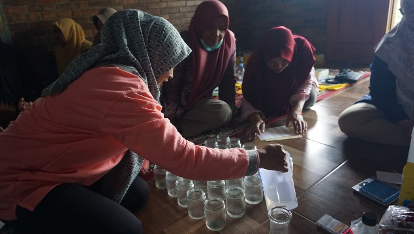
Figure 1. Training on making KJT media (left image) and inserting media into culture bottles (right)
After carrying out activities in the laboratory, training participants were invited to discuss and practice acclimatization at Omah Anggrek. This activity was guided by other KJT research students, namely Fadhila Isnahardiyanti and Khairunisa. Furthermore, monitoring of the results of the activities and solving problems encountered will be carried out by Dr. Andin Irsadi, M.Sc. and Heppy Kristin Natalia.
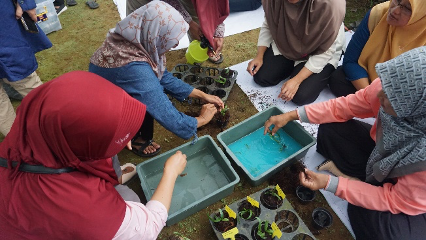
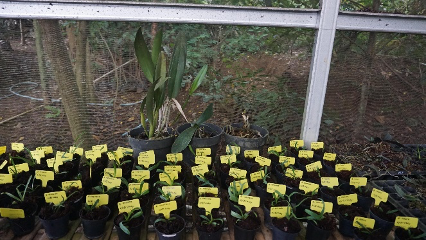
Figure 2. The training participants enthusiastically carried out acclimatization practices (left picture) which resulted in a number of plantlets planted in pots (right picture)
This activity received a positive response from the coordinator of Ngesrepbalong Village conservation activists, namely Mas Simon. He appreciated this progressive step as an effort to enrich the potential for educational tourism in Ngesrepbalong Village. High enthusiasm was also shown by the training participants who felt proud to gain new skills in plant propagation. They are committed to utilizing the laboratory facilities and skills trained in supporting orchid and other plant conservation programs and strengthening the appeal of educational and ecotourism that are being developed in the village.
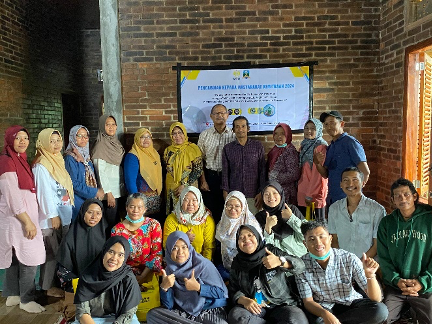
Figure 3. Group photo of Ngesrepbalong Village conservation activists with the Unnes Community Service Team in front of the Ngesrepbalong Village KJT laboratory room

